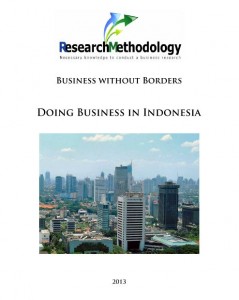Doing Business in Indonesia

- Published: December 2013
- 2472 Words
- 11 Pages
The report starts with the identification of gap in the knowledge about doing business in emerging markets in general, and Indonesia in particular. This is followed by providing recommendations to managers in relation to dealing with specific issues and practices they are likely to be faced with in Indonesia. The report is concluded by providing a summary of the key points of the research and mentioning the key points of advice.
International market expansion opportunities for businesses enabled by intensive economic globalisation during the last several decades have increased the numbers of international assignment for managers at top levels. Importantly, “international managers need to have a clear view of where they want their firm to be in the future; they have to organise to implement their plans; they have to motivate those who work for them; and they have to develop appropriate control mechanisms” (Griffin, 2010, p.161).
However, implementation of all of these tasks in practical levels is associated with a set of significant difficulties that relate to cross-cultural differences, family adjustment issues in a new country, language adaptation challenges and others. This report advises managers seeking to work in an emerging market on management practices in an international and cross-cultural context focusing on Indonesian consumer electronics market.
The main reasons for the choice of Indonesia as an emerging market to be discussed in this report relates to the importance of Indonesia Investment Guarantee Fund – the best practice guarantee facility for investors and the potential possessed by Indonesia to become the next member of BRIC (Wagner, 2012, online) with positive implications on the performance of businesses operating in this country.
1. Introduction 1
2. Identification of Gaps in Knowledge 2
3. Recommendations Regarding Issues and Practices in Indonesia 4
3.1 Cross-Cultural Differences 4
3.1.1 National culture 4
3.1.2 Organisational culture 6
3.1.3 Occupational culture 7
3.2 Corruption and Lack of Transparency 7
3.3 Threat of Terrorism 9
3.4 Distrust of Local Distributors towards Multinational Businesses 9
4. Conclusions: Summary and Key Points 10
References 12
World Bank
- Published: December 2013
- 2472 Words
- 11 Pages




